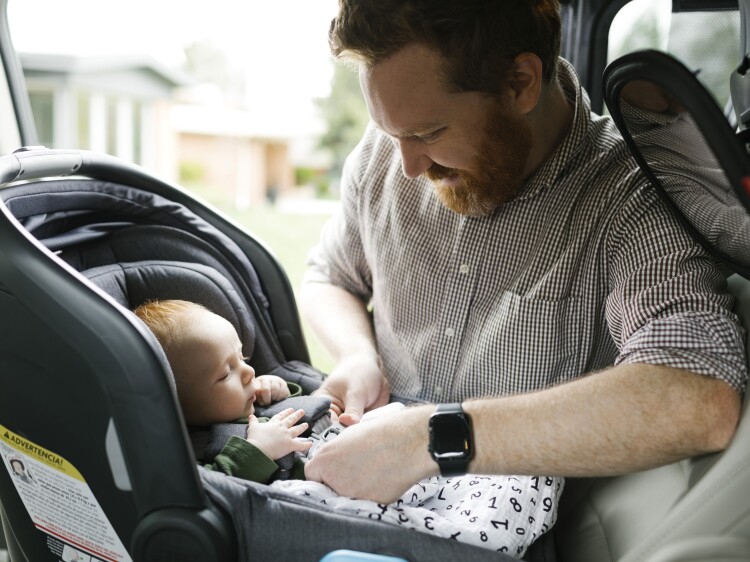Having a baby can bring so much joy. But rising prices may have you wondering: How much does a baby cost in the first year?
Depending on where you live and how much your health care insurance covers, having a baby—from the costs of delivery to annual child care—could fall anywhere between $20,000 and $50,000 or more in the first 12 months.
In this article, we'll detail those common baby expenses and discuss how you can prepare financially for your bundle of joy.
Baby expenses in the first month
Most expenses within your baby's first month will be one-time costs and may be the largest you'll have. Here's what to expect.
Medical expenses: Prenatal care, delivery & postnatal care
Medical expenses will begin even before your baby arrives. The average
Baby's room: Crib, changing table & other essentials
You can have your newborn sleep in a simple bassinet, or you can go full-out and purchase a crib, dresser, rocking chair and other items. Luxury furniture brands at boutiques will cost more than mass-market brands from large retailers. Prioritize safety and functionality as you do your research. In general, baby products should be approved by the
Furnishing baby's room: $400–$2,000 for the year
- Bassinet: $50–$200
- Crib, crib mattress and bedding: $150–$400
- Dresser: $200–$500
- Changing table: $60–$300
- Rocking chair: $70–$300
- Baby monitor: $20–$70
Traveling with baby: Car seat, baby carrier & stroller
Keeping your baby safe in the car will be a high priority. But you also may want to go for walks with a stroller or a baby carrier that can be worn as a harness. Prices for car seats and strollers vary greatly. Items that grow with a baby, like strollers that convert from newborn to toddler, will typically cost more—but you won't have to worry about buying a larger size later on.
Travel gear: $300–$2,000 for the year
- Car seat: $100–$500
- Stroller: $130–$1,000
- Diaper bag and accessories: $50–$200
- Baby carrier: $30–$200
Baby expenses in months two through five
As you get used to your routine with your newborn at home, you'll hit your stride. These next several months will mainly be you feeding, cleaning and caring for your baby. Here are some expenses to account for as you continue to calculate how much a baby costs in the first year.
Daily care: Diapers, wipes & other hygiene items
Disposable diapers and wipes will likely take up the bulk of this budget. Plan to change eight to 10 diapers a day during this time. Using washable cloth diapers could lower your costs, though they are more expensive upfront. Some parents also opt for a diaper pail that holds soiled diapers so the smell doesn't linger. In addition, an infant bath that keeps your little one safe and comfortable in the water should be on the list.
One-time care accessories: $60–$180 for the year
- Baby bath: $15–$60
- Diaper pail: $30–$70
- Bath towels: $15–$50
Recurring care supplies: $840–$1,200 for the year
- Diapers and wipes: $60–$70/month
- Baby soap, lotions and creams: $10–$30/month
Feeding the baby: Bottles, formula, nursing accessories & more
Formula is a major baby expense if you opt to use it. You may need up to two packages a week. If you're nursing and need to pump to store milk for later, a manual pump costs much less than an electric one. You may also want storage bags for your milk and replacement parts to keep your pump operating well. Baby bottles can cost as little as $1 per bottle, and you can buy them in large packs. Bottle brushes help keep the bottles clean. If you want to dish out extra funds, you can purchase electronic bottle cleaners and sterilizers. These can cost $70 to $300.
One-time feeding equipment: $250–$700 for the year
- Bottles and bottle-cleaning brushes: $50–$100
- Electronic nursing pump and accessories (nursing bra, nursing pillow): $200–$600
Recurring feeding costs: $360–$4,800 for the year
- Replacement pump parts and milk storage bags (if nursing): $30–$50 per month
- Formula: $30-$50 per can, average 8 cans per month
Clothing, toys & other miscellaneous expenses
Buying clothes for your newborn shouldn't be too expensive. Families and friends typically love to gift new parents onesies and outfits for the baby. You'll also want items to keep your little one engaged.
Clothes and entertainment: $300-$1,800 for the year
- Clothing: $15–$50 per month
- Baby swings, bouncers and other toys: $10–$100 per month
Child care
If you and your spouse work full time or if you're a single parent, you'll need child care. Even if one parent stays home, you may want help every now and then. Factor a nanny or babysitter into your budget. Having family or friends take care of your baby can help alleviate these costs.
- Annual center-based child care for an infant: $8,300–$17,200
- Annual home-based child care for an infant: $6,500–$11,000
Baby expenses in months six through 12
No longer a newborn, your baby will likely be ready to move and groove, so you'll need to baby-proof your home. Your food budget will also change as your baby explores solid foods. Here's what your expenses might look like once your baby hits the six-month mark.
Baby-proofing items: Gates, playpens & outlet covers
By the time your baby is around six months old, you may be chasing them around the house. Making sure unsafe areas are blocked off, locked up and covered can bring peace of mind.
Baby-proofing equipment: $80–$450 for the year
- Gates: $30–$100
- Playpen: $40–$300
- Cabinet locks, outlet covers and table corner guards: $10–$30
Feeding your infant: Baby food, high chair & other accessories
Babies begin to eat solid foods at around six months. You might purchase baby food or opt to get fresh fruits and vegetables you can puree yourself. Baby food typically costs less than $2 per jar while soft snacks can cost $3 to $5 per pack. Consider a high chair to keep your little one safe at the table.
Mealtime gear: $50–$200 for the year
- High chair, bibs, etc.: $30–$300
Estimated monthly food costs: $1,200-$2,500 for the year
- Purees: $1–$2 per jar, 3 jars per day (~90 jars per month)
- Soft snacks: $2–$4 per bag/box at 2 per week (~8 per month)

How to save for first-year baby expenses
Review your current financial picture
List your current monthly income and expenses. Take account of your total debt and savings. Use the time before your baby arrives to minimize expenses as much as possible.
Also, if you and your spouse both work, consider this: Will you continue to be a two-income household once the baby arrives? Or will you or your partner decide to stay home with the baby?
Establish an emergency fund
Not only should you save for baby expenses, but you'll also want to grow your
Additional considerations to prepare for a baby
Family leave
The type of family leave available through your employer may determine how much time you take off work once the baby arrives. Some companies offer six weeks of paid leave while others offer 12 weeks or more.
All companies are required to offer up to 12 weeks of unpaid leave under the Family and Medical Leave Act. Make sure you and your partner understand paid vs. unpaid leave so you can plan accordingly.
Changes to health insurance
Once the baby arrives, you'll need to expand your health coverage. You may want to be ready for increased spending and consider using tax-advantaged spending accounts.
- Health spending account (HSA). If you have a high-deductible health plan, you may qualify for an
HSA. An HSA allows you to save and pay for qualified medical expenses with pre-tax dollars. You own the account, so any money contributed to this account is yours no matter where you work.
- Flexible spending account (FSA). Similar to an HSA, an
FSA allows you to save for qualified expenses with pre-tax earnings. Unlike an HSA, you don't own your FSA; your employer does. If you change employers, you may lose whatever is left in your FSA.
- Dependent care FSA. This kind of FSA allows you to save and pay for qualified dependent care costs with pre-tax dollars. Similar to an FSA, your employer owns this account, and you usually forfeit your remaining balance if you leave the company.
Child tax breaks
A new baby can affect your
Child tax credit. Through 2025, you may be able to cut income taxes by up to $2,000 for each dependent you have under age 17 that meets certain IRS criteria, such as being your child, step-child or foster child and living with you for more than half the year.
Child and dependent care credit. You may be able to get a credit for costs paid to a qualifying caregiver to care for your child while you were working, actively looking for work or attending school. It's calculated based on your income and a percentage of the expenses associated with care.
Talk with your tax professional to understand the full impact having a baby can have on your tax obligations.
Establishing college savings
College savings plans like a 529 plan allow you to save for qualified education expenses through an investment account that grows tax-free. However, the rules are pretty strict about how you can spend the money. If the expense doesn't qualify as an educational expense, you may be charged a 10% penalty on the withdrawal in addition to income tax assessments. For more flexibility, consider a Uniform Transfer to Minors Act (UTMA) custodial account. These investment accounts are taxable, but the money can be used however you (or the beneficiary) choose(s).
Protecting your family (& finances) after baby
With an expanding family comes more to protect. Consider the following points to help ensure your family is financially protected down the road:
Life insurance is a key component for new parents
Your little one holds a lot of future and promise. You're probably already thinking about everything you want to provide for them. Life insurance can help new parents protect those plans. Parents commonly buy it so they can count on the payout of a death benefit to offset the costs they would have contributed to, such as day-to-day expenses, college or a wedding. But life insurance with
Start by going through
Disability insurance is important for working parents
People sometimes forget that one of their most essential and valuable assets is their ability to earn an income. If you suddenly cannot work, how would you pay your bills? Consider getting
Get key documents in order
This includes creating or updating your will and other
Help with planning for the first-year costs of a baby — & beyond
Having a baby can be an amazing experience, and planning for the cost of a baby will help you enjoy this time even more. But you don't have to prepare alone. A







